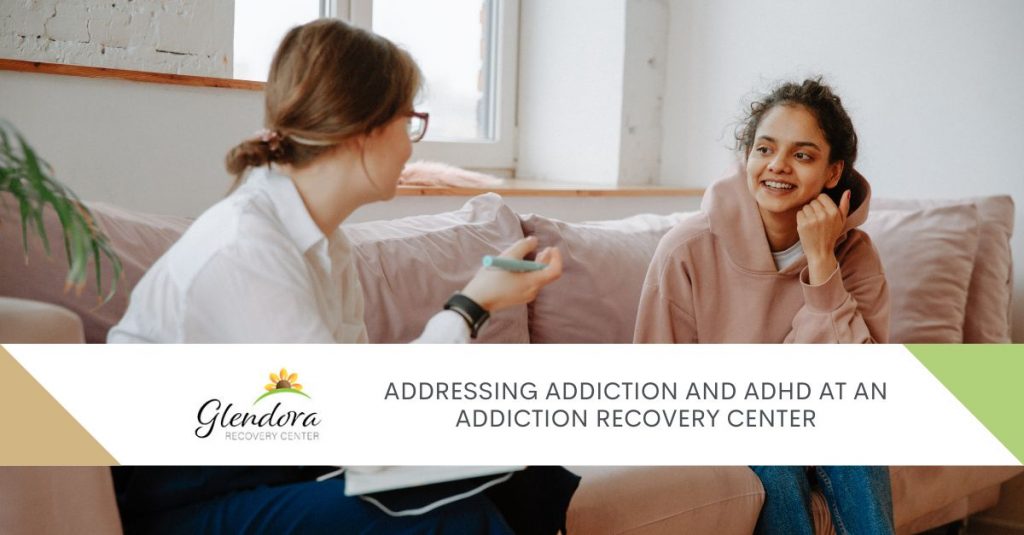A thorough understanding is necessary to fully comprehend the complex relationship that exists between ADHD (Attention Deficit Hyperactivity Disorder) and addiction. Glendora Recovery Center is a highly regarded addiction recovery center that dives deeply into this intricate connection, tracing its neurological and behavioral roots. This exploration is important because it helps us tailor our treatments to the specific requirements of individuals who are battling addiction and ADHD.
The relationship between addiction and ADHD is not purely coincidental; rather, it is rooted on shared brain neural pathways that affect behavior and decision making. In order to promote a comprehensive recovery process at our addiction recovery center, we examine this complex relationship and uncover ways that not only address addiction but also mitigate the underlying symptoms of ADHD.
Brain Dynamics
The Neurological Trace of ADHD
There are clear differences between the neurotypical and ADHD brains, particularly in areas related to executive functioning and dopamine modulation. Motivation and reward sensitivity are impacted by dysregulation of dopamine, a neurotransmitter that has been linked to pleasure and reward systems in ADHD. This imbalance can lead people to seek out stimuli that increase their dopamine levels, which can sometimes lead them towards addictive substances.
Executive Function and Impulse Control
Planning, impulse control, and attention regulation all fall under the category of executive functioning, which is another defining feature of ADHD. These difficulties may exacerbate the already challenging effort of abstaining from addictive behaviors, highlighting the necessity of specialist treatment modalities.
Deciphering the inner workings of the brain in ADHD is like solving a really complex puzzle. Every component—from neural connectivity to dopamine levels—plays a critical part in determining how habits and treatment responses are shaped.
At Glendora Recovery Center, we use this knowledge to create tailored interventions in our recovery programs that directly target these neurological differences, providing a more individualized and successful treatment plan.
Symptom Spectrum
The symptoms of ADHD can appear differently in people across different age groups. While inattentiveness and hyperactivity are common in children, adults may exhibit more subtle symptoms like restlessness and trouble staying organized. These symptoms frequently intersect with addictive behaviors, as people who are experiencing discomfort or difficulty focusing can resort to drugs as a kind of self-medication.
In an addiction recovery center, it’s critical to understand these symptom patterns. It enables a more individualized approach to therapy, acknowledging that impulsivity and reward-seeking behavior associated with ADHD frequently result in an increased risk of addiction.
The Addiction Link
Studies indicate that individuals with ADHD can be more prone to addiction. The causes are complex, combining psychological and environmental elements with the neurological components of ADHD. Substance use disorders are frequently more likely to develop in people who are impulsive and constantly seek stimulation, which might make the appeal of narcotics more alluring.
The tendency toward addiction in people with ADHD stresses the importance of early intervention and specialized treatment. One of the most important steps in stopping the escalation of substance use can be recognizing the indicators and tendencies. At Glendora Recovery Center, our programs are meant to step in at this crucial point and offer the help and direction required to help people find healthy coping strategies.
Are those with ADHD more likely to use certain types of substances over others?
Among people with ADHD, there is a noticeable trend when it comes to substance preferences. Because they can momentarily increase focus and energy, stimulants, which include drugs like cocaine and even prescription medications used to treat ADHD, can be especially appealing. However, abusing these drugs can worsen the addiction cycle leading to more severe repercussions.
Glendora’s Approach
At Glendora Recovery Center, we are aware of the particular difficulties that people with addiction and ADHD face. These particular needs are taken into consideration when designing each and every one of our programs, which include complete aftercare, intensive outpatient programs (IOP), and partial hospitalization programs (PHP).
To address both ADHD and addictive behaviors, our approach combines a number of therapeutic modalities. Our programs are designed to promote resilience and healthy coping strategies ranging from mindfulness exercises that improve impulse control to cognitive-behavioral therapy that helps rewire thought patterns.
Our commitment to personalized care extends beyond the walls of our center, as we empower our clients with skills and knowledge that last a lifetime. Our aftercare programs make sure that every person has the continuing assistance they need to maintain their sobriety and properly manage their ADHD symptoms in their daily lives. Our team understands that the journey through ADHD and addiction treatment is a lifelong process.
Entire Support
In addition to individual and aftercare treatments, our group sessions also provide a safe haven where people may share experiences and strategies. This holistic approach not only addresses the addiction but also gives people the tools they need to successfully control their ADHD symptoms, opening the door to a long-lasting and fruitful recovery.
A Pathway to Recovery and Stability
The path of understanding and dealing with the relationship between ADHD and addiction is a challenging one. However, with the correct assistance and specialized treatment plans, it’s a journey that can result in significant healing and transformation. Our mission at Glendora Recovery Center is to support our clients as they make this journey; from the chaos of addiction and ADHD to the serenity of stability and healing.
If you’re ready to embark on this transforming path or if you’d want more details about our tailored treatment plans in our addiction recovery center, we invite you to get in touch with any member of our team. By working together, we can overcome the difficulties caused by ADHD and addiction, transforming challenges into opportunities and paving the way for a more promising and brighter future.



